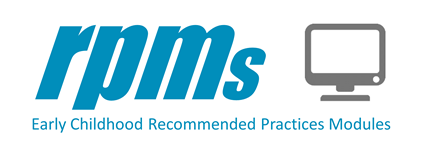Resource Search
Keyword Search
26 results found
After observing or participating in a form of assessment, use this tool to reflect on the implementation of assessment practices and the impact on child and family outcomes, and identify ways to improve. These reflections will be used to help design your action plan.
Check Your Knowledge questions and feedback for Module 7 Assessment, Lesson 1 Ask the Expert
Check Your Knowledge questions and feedback for Module 7 Assessment, Lesson 2 Gathering Information
Check Your Knowledge questions and feedback for Module 7 Assessment, Lesson 3 Take Action
Ask the Expert content from Jane Squires for the Assessment Module.
DEC Recommended Practices list for Assessment
IDEA Statute and Regulations for Part C – Infants and Toddlers with Disabilities
IDEA Statute and Regulations for Section 619 of Part B
This checklist includes key characteristics of authentic assessment practices for observing child participation in everyday activities, the real world learning opportunities that occur in the activities, child behavior in the everyday learning opportunities, and the particular learning opportunities that provide a child the richest array of competency-enhancing learning opportunities.
The Individualized Family Service Plan (IFSP) is a written plan that is developed for each eligible infant and toddler with a disability. The Part C regulations specify, at 34 CFR §§303.342 - 303.345, the procedures that State Lead Agencies and early intervention service providers must follow to develop, review, and revise an IFSP for each child. The document below sets out the IFSP content that those regulations require.
Informed clinical reasoning is a process team members use to gather information about a child’s developmental functioning in order to make decisions about the child’s eligibility for intervention services. The process requires knowledge of both typical and atypical child development and involves gathering information about the child’s functioning using interviews with parents and other caregivers, direct observations of the child, and review of results from evaluations and developmental assessment instruments. These elements constitute the foundation for becoming “informed” about a child’s developmental abilities and needs in
the context of everyday activities or natural environments.
Presentation handout for Module 7 Assessment, Lesson 1 Ask the Expert
Presentation handout for Module 7 Assessment, Lesson 2 Gathering Information
Presentation handout for Module 7 Assessment, Lesson 3 Part 1
Presentation handout for Module 7 Assessment, Lesson 3 Part 2
Presentation handout for Module 7 Assessment, Lesson 3 Part 3
References and resources for the Assessment module
Handout for Module 7 Assessment, Voices From the Field - Jen Brown
Handout for Module 7 Assessment, Voices From the Field - Jennifer Kaufman
Handout for Module 7 Assessment, Voices From the Field - Karen Nemeth
Handout for Module 7 Assessment, Voices From the Field - Mary Clare Freeman
Handout for Module 7 Assessment, Voices From the Field - Patricia Maris
Handout for Module 7 Assessment, Voices From the Field - Veda Crandall
Recommendations, with specific indicators of effective practice, intended to help policy makers, program administrators, teachers, and others improve screening and assessment practices for young English language learners.
